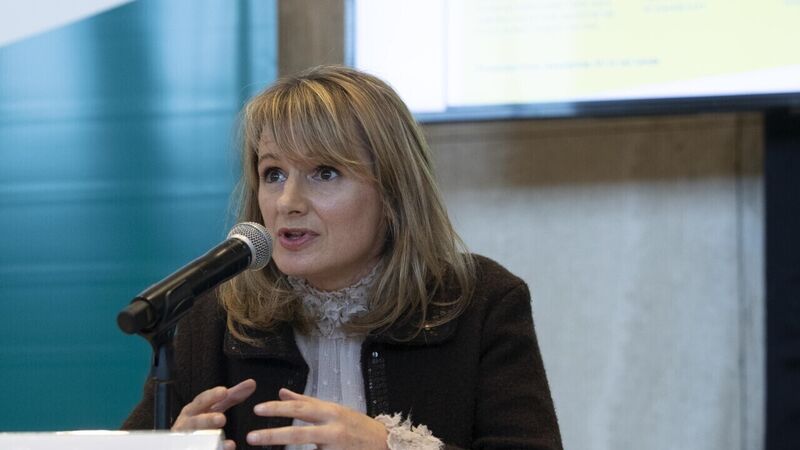We need a new vision for the role of Chief Medical Officer

The State’s top doctor, Professor Breda Smyth is supposed to be supported with four deputies each with a specific set of responsibilities. Currently two of those posts remain unfilled while another staff member is on sick leave.
Ireland has lost two chief medical officers (CMO) in the last 18 months. The State’s top doctor, Professor Breda Smyth is supposed to be supported with four deputies each with a specific set of responsibilities. Currently two of those posts remain unfilled while another staff member is on sick leave.
The main role of the CMO is to plan and deal with crises. Prof. Smyth’s predecessor, Dr Tony Holohan who led the country through the recent covid-19 pandemic, had plenty to contend with including swine flu and the CervicalCheck debacle.
Prof. Smyth’s tenure in the CMO role has focused on Ireland’s preparedness for another pandemic. But is there a case to be made for the office of the CMO engaging more actively with other major crises that are less immediately catastrophic but have a massive impact at population level in the health and wellbeing of our society?
At the same time the office is significantly understaffed, undermining its ability to deal with both acute and chronic medical emergencies. A critical factor in the inability to maintain and recruit deputy CMOs to the office is pay.
Following the covid-19 pandemic, Irish public health doctors received overdue recognition for their role in health protection with the appointment of more than 80 public health consultants with specific responsibilities in the areas of health protection, health and wellbeing, health intelligence and health services improvement.
While newly appointed consultants offer salaries of €250,000, the deputy CMO post was advertised last year at a pay band of €114,000 to 139,000 — about half of what a similarly qualified public health consultant can now earn in the HSE.
Is it any wonder that the deputy CMO posts remain vacant, and when advertised in 2023 received no expressions of interest? The CMO post at a salary level of just over €200,000 is also below the salary received by the freshly appointed public health consultants.
Department of Health General Secretary, Robert Watt, has made a business case for addressing these discrepancies but has been unsuccessful to date.
The Office of the CMO has a key strategic role in providing expert public health advice to the Minister for Health and Ministers of State, with direct responsibility for health and wellbeing and bioethics.
The job specification of the Deputy CMO post advertised last year cites ensuring "robust mechanisms are in place to identify emerging threats in communicable and noncommunicable disease", and the need to "reduce health inequities by creating healthy policy to address the health needs of marginalised groups".
Here are a couple of key areas where the Office of the CMO could advise the Health Minister that have the potential to have a transformative impact on the medium and long-term health of all Irish citizens — including those from low-income groups.
Most people live in an environment that is profoundly obesogenic. Food markets are saturated with calorie-dense food that is high in fat, sugar and salt and incessantly marketed amid physical environments where it is often impossible to walk to the local shop, school, work or even for leisure.
The system is biased against children from low-income families from the very start, ensuring they have a higher lifetime risk of obesity and chronic disease including type 2 diabetes, heart disease, cancer and dementia. Input from the CMO could play a key role in addressing this healthy inequity.
What legislative measures would impact on improving the food environment? A ban on online marketing of junk food, a tax on junk food, a 9pm broadcasting watershed on advertising unhealthy food and drinks, a banning of price promotions and end-of-aisle and check-out positioning of junk food.
In terms of physical activity, a local community group, Sporting Liberties recently brought a decades-long campaign for a playing pitch to Leinster House, as the community tries to keep youngsters out of the clutches of drug and crime lords in Dublin’s inner city. More than 8,000 children have no green area to play in.
A huge increase in momentum is needed to ensure that citizens of all ages and income backgrounds can move about their communities safely on foot or on two wheels.
The government’s Sale of Alcohol Bill proposes to increase trading hours of all bars and restaurants from 11.30pm to 12.30am and facilitate late-night opening of bars to 2.30am.
Recent evidence from Norway published in Health Economics (2022) adds to the mounting evidence that when opening hours are extended in areas where there is limited public transport, more drink-driving incidents will occur. Specifically, a one-hour extension in trading hours was associated with up to 30% more collisions in rural areas.
The Sale of Alcohol Bill proposals will not only put increased pressure on policing resources around late-night venues for public safety management, it will further deplete the numbers available for traffic duty.
All of this points to a perfect storm that will lead to more road deaths — particularly on rural roads with an absence of both public transport and a dearth of policing. The CMO could play a key role in advising the Minister for Health to seek a Health Impact Assessment of the Sale of Alcohol Bill.
Low vaccine rates post pandemic emerged because of practical difficulties in accessing vaccination clinics but also because of a more sinister factor — the rise of the anti-vaccine movement that now threatens the future of childhood vaccination programmes.
The CMO can provide the evidence base to the minister of how best to address vaccine hesitancy and anti-vaccine activities. What is needed is an effective campaign that respectfully explains the risks of vaccines and champions their safety and efficacy — before another highly infectious and preventable disease outbreak sweeps the country and creates havoc.
Towns across Ireland are devoid of sufficient numbers of family doctors.
An Irish College of General Practitioners paper (2022) documented the need for the primary care workforce to increase by over a third (37%) to meet demand. Factors contributing to the GP deficit include a growing population, people living longer with more complex and incremental needs and an ageing GP workforce.
The paper identified key options to resolve the GP workforce and workload crises, including the expansion of multidisciplinary teams and practice nurses and provisions of suitable GP premises.
Potential solutions include the support of non-EU GPs to become valued members of the workforces, guaranteed availability of locum cover, and increasing capacity for remote consulting.
The CMO can provide a vital role in advocating for resources to be made available in a timely manner to ensure that vital services are maintained and expanded where they are most needed.
The office of the CMO has the potential to significantly impact on health and wellbeing at all levels of society by advising the Health Minister on the urgent need to legislate and resource a healthy food and physical environment as well as robust community health services.
In order to achieve that, remuneration of the chief and deputy chief medical officers must align with equivalent roles within current public health specialties, so that vital positions within the office can be filled and urgent and ongoing health crises can be effectively addressed.
- Dr Catherine Conlon is a public health doctor in the HSE





